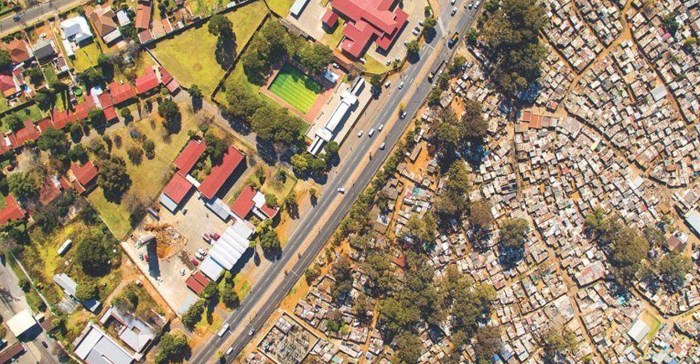The arrival of the Covid-19 pandemic came at a time when the South African economy was already under severe strain, posing not just a health risk to the people, but threatening livelihoods as well. As government, business and ordinary citizens deal with the pandemic, it's important that there is also a focus on ensuring the economy can be nursed back to health and that the country is put on a proper growth path for the future - a future that includes all South Africans.

Source: Alternative Information andDevelopment Centre
“When we talk about the road to economic recovery, we shouldn’t just be talking about restoring the status quo before Covid-19. We have an opportunity to re-imagine a new economy that’s more relevant to all South Africans – one that recognises the injustices of the past," said South Africa Revenue Service (Sars) Commissioner Edward Kieswetter in Investec's Road to Economic Recovery webinar.
President Cyril Ramaphosa alluded to creating a new South African economy and it is becoming increasingly evident that we really are paying the price of being such an unequal country. The economy was already feeling the pressure of a recession and following lockdown the situation has since worsened. “There has been a significant loss of economic capacity. Taxes are down, and consumer activity is contracting. Many companies may not recover, and the jobs lost will be hard to restore," he said.
Last year saw the wholesale and retail industries contract by 4%, construction by over 6%, transport, storage and logistics by almost 8% and as such, key sectors were already in a decline and the last two months could be the final straw for many businesses. In fact, accordingly to Sars to date, 144 companies have already applied for business rescue this year, compared to just over 200 over the full 12 months of 2019.
Worried about too slow lifting of lockdown
Investec Bank SA CEO, Richard Wainwright acknowledged that sectors such as tourism, hospitality, property, mining, construction and certain types of retail have been particularly hard hit – with some firms seeing revenues of zero overnight and many likely to take a long time to recover.
“I’m most concerned about smaller companies. Looking around the world governments that had the fiscal space immediately put stimulus packages in place to let the smaller entrepreneurial SME companies survive. South Africa was slow, as a consequence of the lack of fiscal space, however measures have now been put into place to help businesses, in the form of the Covid-19 lending scheme, and we are hopeful we can get that money into the economy as fast as possible," he said.
The road to economic recovery is also very dependent on what the lifting of the lockdown looks like. Many are expecting a U-shaped recovery with a long, extended base – with the focus on how to shorten the recovery time and ensure that we don’t find ourselves in a W-shaped recovery with an extended decrease in activity.
“We are concerned about a too-slow lifting and what this could do to jobs – we’re looking at 4.9-million jobs potentially being lost over the next few months. It is crucial therefore to get the balance right between opening up the economy and controlling the spread of the disease. There are a substantial number of variables in play. Were we able to move the peak of the transmission outside of our winter season? What will be the economic impact and what about the psychosocial impact - which could affect willingness to go back to a normal life, event after restrictions are lifted? Unfortunately, there are no binary answers," Wainwright said.
Complex system
Kieswetter also encouraged decision makers to think about each industry not as disconnected sectors, but rather as complex systems and value chains. Removing lockdown regulation for example in one sector, may have upstream or downstream dependencies on another. He also pointed to the fact that we cannot simply think of reopening of an economy to restore the status quo because that assumes that everything was right before.
Wainwright agreed, saying that as we discuss the road to economic recovery, we need to be cognisant and accountable in that we have not been successful at addressing inequalities. We are still one of the most unequal societies in the world and in times of crises the poor, the most vulnerable, suffer the most. “The way that we reopen the economy is an opportunity for us to address those gaps in our public health system, legacy infrastructure, housing related infrastructure and even public transport – a true public-private partnership. It’s also an ideal opportunity to look at new ways of doing things, new business models and using technology to drive change.”
“Going forward, we have to think of problems as collective South African problems, not other people’s problems. We cannot think of reopening just to restore the status quo, we need to bring our collective ingenuity and human endeavour to address and reimage our South Africa. We continue to fight with each other insight of fighting for each other and if Covid-19 doesn’t wake us up, nothing will,” said Kieswetter.
































